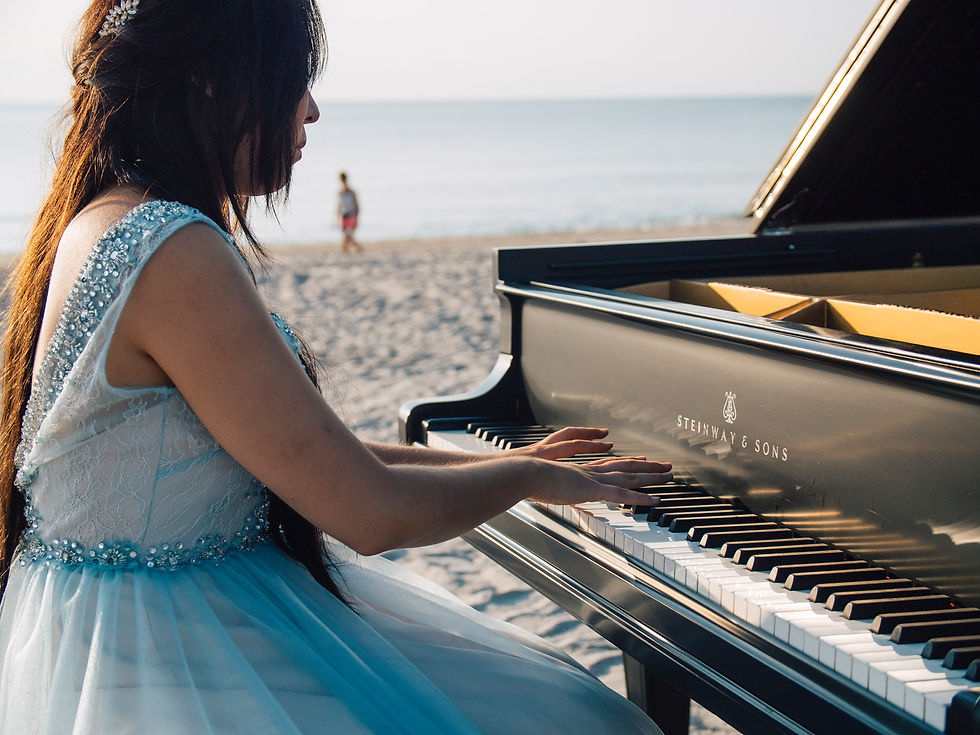Why Studio Recitals Are Essential for Piano Students: A Piano Teacher's Perspective
- Dr. Shuree Enkhbold

- Aug 19, 2024
- 3 min read
As a piano teacher, one of the most rewarding aspects of my job is watching students grow, not only in their musical abilities but also in their confidence and character. One of the most effective ways to foster this growth is through studio recitals. These events are much more than just an opportunity for students to perform; they are a crucial part of the learning process that offers a host of benefits, both musical and personal.
Building Confidence and Stage Presence
From the teacher’s perspective, one of the most important benefits of studio recitals is the confidence it instills in students. Many of my students start their piano journey with a natural hesitation about performing in front of others. The nerves that accompany public performance are real, but the supportive environment of a studio recital helps students face these challenges head-on. Over time, with each recital, I see students become more comfortable and confident, not just in their playing but in themselves. This confidence often extends beyond the piano, positively affecting other areas of their lives.
Motivating Practice and Goal-Setting
Studio recitals also provide a powerful motivational tool. When students know they are working toward a specific performance date, their practice sessions become more focused and purposeful. They are no longer just playing through their pieces; they are refining them, paying attention to details they might otherwise overlook. This goal-oriented approach teaches them the value of setting and achieving objectives, a lesson that is incredibly beneficial both in music and in life.
Deepening Musical Expression
As a teacher, I strive to help my students not only play the notes correctly but also connect with the music on a deeper level. Studio recitals are the perfect platform for this. Preparing for a recital encourages students to think beyond technique and consider the emotional and expressive aspects of their pieces. They learn to tell a story through their music, to convey the emotions that the composer intended. This deeper engagement with the music enhances their overall musicianship and makes their performances more compelling and meaningful.
Receiving Constructive Feedback
One of the most valuable aspects of a studio recital is the opportunity for students to receive constructive feedback. In our studio, after each recital, we take time to discuss the performances. I offer my insights, and we often have peers share their thoughts as well. This feedback is not about criticism but about growth. It helps students recognize areas where they can improve while also celebrating what they did well. Learning to accept and apply feedback is a crucial skill that helps students grow not only as musicians but as learners in general.
Creating a Supportive Community
Studio recitals also play a vital role in building a sense of community within our studio. These events bring students together, allowing them to share their progress and achievements with one another. Watching peers perform can be incredibly inspiring and educational. It fosters a sense of camaraderie, where students support and encourage each other. This community aspect is something I value deeply, as it creates a positive and nurturing environment that enhances the learning experience.
Enhancing Memory and Focus
Preparing for a recital often involves memorizing pieces, a task that significantly enhances students’ memory and focus. The process of memorization requires deep internalization of the music, which in turn improves cognitive abilities. During the performance itself, students must stay fully focused, managing any nerves or distractions. These skills—focus, concentration, and the ability to perform under pressure—are invaluable and will benefit students in all areas of their lives.
Celebrating Progress and Achievement
Finally, studio recitals are a time to celebrate. They are an opportunity for students to showcase the progress they have made and for me, as their teacher, to celebrate their hard work and dedication. There’s something incredibly rewarding about seeing a student successfully perform a piece they’ve worked on for months. It’s a moment of pride and accomplishment for the student, their family, and for me as their teacher. It reinforces the joy of making music and motivates students to continue their musical journey.
























Comments